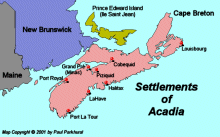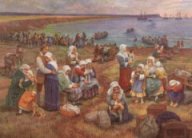|
Everyone today knows of the Louisiana Cajun, their flavorful
food such as jambalaya and crawdads, their rural life on the Mississippi, and
their exotic French origins. But where
did the Cajuns come from?
The Early Years
 The answer goes back to
1600's Canada. In the early 17th
century, the French sent merchants to what are now Quebec and the maritime
provinces of Canada. Their main goal
was the lucrative fur trade. By 1622,
there were several French settlements in New France (an area which included
present-day Quebec, New Brunswick, Nova Scotia, and Prince Edward Island),
including Port Royal in the southwest of the region known as "Acadie" or
Acadia. By 1628, Canada and Acadia was
under English and Scottish control. Their
aim was to turn Acadia into "New Scotland" (hence, the area where Acadia is
today is known as Nova Scotia). In
1632, France once again controlled Canada under the terms of the Treaty of St.
Germain-en-Laye. In order to maintain
French control of the area, Cardinal Richelieu, who was in power in France at
the time, began the colonization of New France. The first shipload of colonists left
France on July 4, 1632.
The answer goes back to
1600's Canada. In the early 17th
century, the French sent merchants to what are now Quebec and the maritime
provinces of Canada. Their main goal
was the lucrative fur trade. By 1622,
there were several French settlements in New France (an area which included
present-day Quebec, New Brunswick, Nova Scotia, and Prince Edward Island),
including Port Royal in the southwest of the region known as "Acadie" or
Acadia. By 1628, Canada and Acadia was
under English and Scottish control. Their
aim was to turn Acadia into "New Scotland" (hence, the area where Acadia is
today is known as Nova Scotia). In
1632, France once again controlled Canada under the terms of the Treaty of St.
Germain-en-Laye. In order to maintain
French control of the area, Cardinal Richelieu, who was in power in France at
the time, began the colonization of New France. The first shipload of colonists left
France on July 4, 1632.
 Compared to the England's American colonies, New France never had the population
or the resources necessary to defend themselves and remained an easy target for
English aggression. By 1710, only some 1,500 people called Acadia their home,
compared with 16,000 in all of New France, and over 350,000 in the American colonies.
In September of 1710, the English again attacked Port Royal, this time with 3,400 troops.
France refused to supply New France and they had only 300 soldiers to defend the outpost.
By 1713, France ceded Acadia and Port Royal to the English.
In 1730, the Acadians swore and oath of allegiance to King George II of England and for
the next 20 years, lived in relative peace and prosperity.
Compared to the England's American colonies, New France never had the population
or the resources necessary to defend themselves and remained an easy target for
English aggression. By 1710, only some 1,500 people called Acadia their home,
compared with 16,000 in all of New France, and over 350,000 in the American colonies.
In September of 1710, the English again attacked Port Royal, this time with 3,400 troops.
France refused to supply New France and they had only 300 soldiers to defend the outpost.
By 1713, France ceded Acadia and Port Royal to the English.
In 1730, the Acadians swore and oath of allegiance to King George II of England and for
the next 20 years, lived in relative peace and prosperity.
The French and Indian War
When war again broke out between France and England in the 1740's, France tried again to retake
Acadia. They sent a large fleet to Port Royal in 1747, most of which was destroyed in
storms at sea. When the French met the English as the small outpost of Minas (Grand Pre),
the French succeeded in ousting the English and began building a fort at Beausejour. The
relationship of the Acadians with their English lords had always been tenuous, but after some
Acadians were convinced by the French to join Indian troops to march on Minas, the English
again demanded an oath of allegiance from the Acadians, this time more stringent than the
first. Many Acadians refused, stating they had already swore an oath to the King of
England. Some were imprisoned and others were threatened with expulsion from Acadia.
By 1755, the seeds of distrust had already been planted. The English wanted the
Acadians out of Acadia.
The Exiles
 In 1755, 6,000 Acadians were forcibly removed from Acadia and spread out across the American
colonies, including 1,500 to Virginia, over 900 to South Carolina, and another 900 to
Maryland. Another 3,000 were expelled in 1758 after the fall of Louisburg and were sent
to St. Malo, France. Still others were detained in England in 1763. By the time of the
Treaty of Paris in 1763, which officially ended the war, most of the Acadian settlements of Port
Royal, Grand Pre, Pisiquid, and Beaubassen had been burned and other non-Acadian settlers had
already began moving in. Acadia was no more.
In 1755, 6,000 Acadians were forcibly removed from Acadia and spread out across the American
colonies, including 1,500 to Virginia, over 900 to South Carolina, and another 900 to
Maryland. Another 3,000 were expelled in 1758 after the fall of Louisburg and were sent
to St. Malo, France. Still others were detained in England in 1763. By the time of the
Treaty of Paris in 1763, which officially ended the war, most of the Acadian settlements of Port
Royal, Grand Pre, Pisiquid, and Beaubassen had been burned and other non-Acadian settlers had
already began moving in. Acadia was no more.
The Cajuns
Between 1764 and 1785, many of the relocated Acadians made their way into the French-dominated
colony of Louisiana. By this time, Louisiana had been ceded by France to Spain and was a
Spanish colony. However, Louisiana was very sparsely populated and the interior contained mostly military
units and traders. Spain wanted more settlers in Louisiana to defend against continued
English aggression in the area. So, in 1785, Spain paid for seven ships to carry expatriated
Acadians living in France to help settle some of the interior of Louisiana. Most of these
Acadians settled near Bayou Lafourche in an area known as the Acadian Coast.
Today, the descendants of the Acadians who settled in Louisiana are known as "Cajuns," a corruption
of the word "Acadian." They are the most predominant group in Louisiana. Their unique
culture, hard work, and rugged individualism has helped shape Louisiana into the diverse American
state it is today.
Conservative and Patriotic Links

|
Boy Scouts of America
|
|
I received my Eagle Scout award in
December of 1980. It is one of the things I'm most
proud of. The Boy Scouts of America teach not only
patriotism and love of country, but personal growth,
responsibility, honor, and leadership.
|
| |

|
Hot Talk 560 KSFO
|
|
This is the station I have permanently dialed in my car. KSFO
is the premier conservative talk radio station in the otherwise
liberal Bay Area. For a dose of sanity, it's always good to listen
to what they have to say.
|
| |

|
The Rush Limbaugh Show
|
|
One of the main reasons I listen to KSFO is because of this man.
Always controversial, always entertaining, Rush espouses the principals
of today's conservative movement. Whether you're conservative, liberal,
or in the mushy middle, Rush will always make you think.
|
| |

|
|
I've subscribed to National Review magazine, founded by William F. Buckley, Jr.,
for about 10 years now. It offers a refreshing change of pace to the other
supposed "news" magazines. It's conservative, smart, biting, and even ruthless,
but always right on the money. If you're looking for a conservative
news magazine, this is the one.
|
| |

|
|
This website is the grassroots presence of the Republican party
online. You'll find just about anything you want to know about the
Republicans and conservatism in general at this website.
|
| |
|



